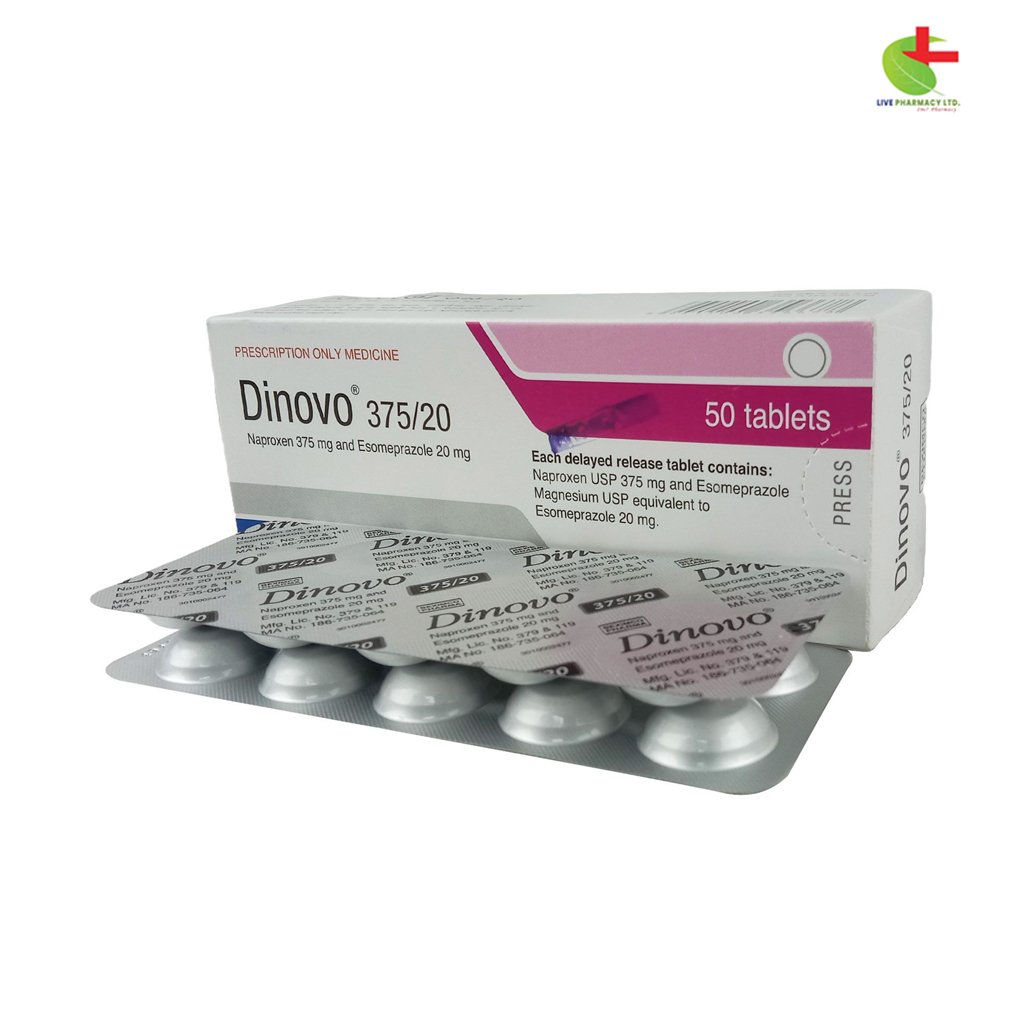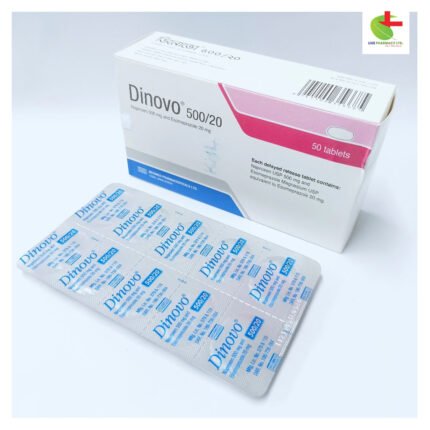Dinovo 375
120.00৳ Strip
- Naproxen & Esomeprazole is used for managing osteoarthritis, rheumatoid arthritis, and ankylosing spondylitis.
- It reduces the risk of NSAID-related gastric ulcers.
- Combines Naproxen, an NSAID, with Esomeprazole, a proton pump inhibitor.
- Helps reduce pain and inflammation while protecting the stomach from gastrointestinal side effects.
Indications
Naproxen & Esomeprazole is prescribed for:
-
- Management of Osteoarthritis
- Treatment of Rheumatoid Arthritis
- Alleviation of Ankylosing Spondylitis
- Prevention of NSAID-related Gastric Ulcers in at-risk patients.
Pharmacology
This formulation features an immediate-release Esomeprazole Magnesium layer and an enteric-coated Naproxen core. Esomeprazole is released first in the stomach, followed by the dissolution of Naproxen in the small intestine. Naproxen works as an NSAID with analgesic and antipyretic effects by inhibiting prostaglandin synthesis. Esomeprazole, a proton pump inhibitor, reduces gastric acid secretion by targeting the H+/K+ ATPase enzyme.
Dosage
- Adults & Adolescents (15+ years): Take one tablet twice daily of either 375 mg Naproxen/20 mg Esomeprazole or 500 mg Naproxen/20 mg Esomeprazole.
- Adolescent Patients (12+ years):
- Weighing over 50 kg: 375 mg Naproxen/20 mg Esomeprazole or 500 mg Naproxen/20 mg Esomeprazole.
- Weighing 38 kg to less than 50 kg: 375 mg Naproxen/20 mg Esomeprazole, taken twice daily.
Administer at least 30 minutes before meals. Do not split, chew, crush, or dissolve the tablet.
Interactions
- Medication Interactions:
- NSAIDs may reduce the effectiveness of ACE inhibitors, diuretics, and beta-blockers.
- Concurrent use with warfarin may increase bleeding risk.
- Esomeprazole may affect the absorption of drugs dependent on gastric pH (e.g., ketoconazole).
- Food Interactions:
- High-fat meals can delay Naproxen absorption and reduce peak plasma concentration.
Contraindications
- Contraindicated in individuals with hypersensitivity to any component or substituted benzimidazoles.
- Not recommended for use during peri-operative periods of coronary artery bypass graft (CABG) surgery.
Side Effects
- Common: Diarrhea, fever, headache, nausea, vomiting, skin reactions, upper respiratory infections.
- Uncommon: Anxiety, abnormal behavior, depression, dizziness, sleep disorders.
- Rare: Angioedema, hallucinations, hepatic disorders, suicidal tendencies.
Pregnancy & Lactation
- Pregnancy: Avoid use during the third trimester. Use only if benefits outweigh risks during the first and second trimesters.
- Breastfeeding: Not recommended due to unknown effects on breast milk.
- Fertility: NSAIDs like Naproxen may impair female fertility.
Precautions & Warnings
- Avoid combining with other NSAIDs to reduce the risk of serious adverse effects.
- Use the lowest effective dose for the shortest duration to minimize gastrointestinal and cardiovascular risks.
- Monitor elderly patients closely for gastrointestinal bleeding and other adverse effects.
- Gastrointestinal Effects: Be cautious with NSAIDs due to the risk of serious GI events, especially in patients with a history of ulcers.
- Cardiovascular Effects: Caution required for patients with cardiovascular conditions.
Use in Special Populations
- Elderly: Adjust doses carefully, as unbound plasma levels may increase.
- Renal Impairment: Not recommended for moderate to severe renal impairment.
- Hepatic Insufficiency: Monitor and potentially reduce dosage for mild to moderate impairment.
Overdose Effects
- Naproxen Overdose: Symptoms include lethargy, dizziness, and gastrointestinal discomfort. Manage with supportive care and symptomatic treatment.
- Esomeprazole Overdose: Symptoms are generally transient. No specific antidote is known; supportive care is recommended.
Therapeutic Class
Osteoarthritis Medications, Rheumatoid Arthritis Treatments, Non-Steroidal Anti-Inflammatory Drugs (NSAIDs).
Storage Conditions
Store below 30°C, protect from light and moisture. Keep out of reach of children.












Reviews
There are no reviews yet.